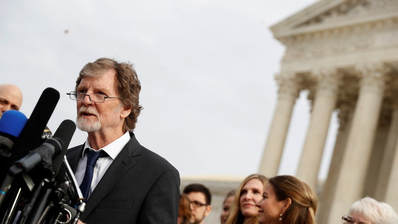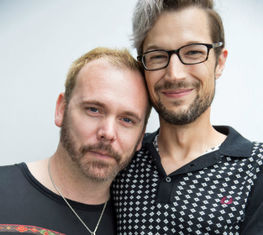 Friends, I've felt ill about the Masterpiece Cakeshop ruling all day. (For an explanation of the case, see my last post.) As you probably know by now, the Supreme Court ruled against Charlie and David, the gay couple who were refused a wedding cake because of their sexual orientation. The big issue in the case was whether baking a cake was "speech"--that is, whether Colorado's requirement that the baker treat gay and straight people the same was making him "speak" in favor of gay marriage. If baking a cake was speech (like painting a mural probably would be), it would violate the baker's First Amendment right to free speech. If, on the other hand, it was more like providing a service (like selling someone a couch probably would be), it would probably not violate the baker's First Amendment right to free speech. In oral argument, this was the issue the Court spent most of its time on. However, the Court did not rule on this issue. Instead, they said that the baker's freedom of religion (a different part of the First Amendment) had been violated by the Colorado Civil Rights Commission, which decided the case before the case even hit the courthouse. They essentially said that the Commission had been "hostile" to religion. The part that seemed to incense them the most was: I would also like to reiterate what we said in the hearing or the last meeting. Freedom of religion and religion has been used to justify all kinds of discrimination throughout history, whether it be slavery, whether it be the holocaust, whether it be—I mean, we—we can list hundreds of situations where freedom of religion has been used to justify discrimination. And to me it is one of the most despicable pieces of rhetoric that people can use to—to use their religion to hurt others. Personally, I disagree that this is hostile to religion. I think it's a statement of fact: religion has been used to justify all these things. It seems to me that the commissioner was just trying to say, "Hey, freedom of religion isn't dispositive--you don't get to do anything you want by claiming it's against your religion." But--as I understand it--the Supreme Court said this embodied discrimination (that is, the commission committed discrimination, not that the baker's freedom of religion would have been violated if he'd had to bake the cake, just that the Colorado Civil Rights Commission didn't give him a fair shot). So in theory, this isn't some major victory for anti-gay folks, just a reminder that states' processes need to respect people's freedom of religion. In theory, this ruling leaves open the possibility that Colorado could still prohibit business owners from discriminating against gay people, but that they need to do via processes that don't violate anyone's First Amendment religious freedom along the way. But I still feel like (1) If they wanted to do that, they should have just remanded the case (meaning, sent it back down and told the state to redo the process in a fairer way rather than actually ruling on it; (2) Psychologically, sociologically, and culturally, this is a major defeat; (3) If they weren't okay with anti-gay discrimination, they would have ruled on the substantive issue; (4) Legally, this is going to set us back a bit and in the meantime, more gay people will be subjected to unfair treatment; (5) This feeds into the myth that religion and progressive politics are somehow inherently oppositional. For more reading about the case, I recommend the New York Times and SCOTUS Blog. Any other takes on this?
1 Comment
 I was incensed this morning when I stumbled on an editorial in the Washington Post by the baker in the Masterpiece Cakeshop case, Jack Phillips, in which Phillips grossly mischaracterizes what the case is legally about. Here are the facts. Charlie and David (pictured left) lived in Colorado. They got engaged in 2011, before gay marriage was legal throughout the U.S. Since it wasn’t legal in Colorado, their plan was to fly to Massachusetts, get married there (where it was legal), and fly back to Colorado to have their reception. They hired a planner to help them with the reception, and the planner told them them that Masterpiece Cakeshop made great cakes. Charlie’s mom was visiting from Wyoming to help with wedding planning, and the three of them went to Masterpiece Cakeshop. They sat down and Jack Phillips, who was working that day, looked up and said, “Hi, who’s the cake for?” Charlie and David said, “It’s for us.” And Phillips said, “I don’t make cakes for same-sex weddings.” The couple was mortified—especially Charlie, since it happened in front of his mom. They filed a complaint with the Colorado Civil Rights Commission that their civil rights had been violated. The Commission agreed, and the Colorado courts ruled in favor of Charlie and David, too. Phillips appealed to the Supreme Court, arguing that he shouldn’t have to make a cake for a gay couple because it violated his religious belief that gay marriage was morally wrong. He said Colorado was forcing him to choose between his livelihood and his moral beliefs.
Yes, Phillips has a right to religious freedom. But this case is not about religious freedom. Phillips writes that although he would have sold Charlie and David anything else in the shop, he "couldn't design a custom cake to celebrate their same-sex marriage." This makes it sound as if they asked him to put their names on the cake, or to top it with a pair of smiling grooms. But they didn't--and if they had, it would be a very different case. Instead, they asked for a cake--a cake without any speech on it at all. It is difficult to argue that something becomes "speech" simply because you know it's going to be used for a particular purpose. Phillips was not forced to say anything or write anything that went against his religious beliefs. He writes that if the Supreme Court rules against him, it will "banish his beliefs" from the marketplace. But this completely misunderstands the legal issue. Phillips opened a business to the public. Under Colorado law, you don't get to do that and then decide that you won't sell your product to certain of its members. Suppose a toy store owner wouldn't sell toys to mixed-race kids because the idea of miscegenation went against his religious beliefs? The case was argued in front of the U.S. Supreme Court in December of last year, and it will be handed down any day now--possibly as soon as Monday. From the oral argument, it was hard to figure out which way the justices were leaning. They spent a lot of time talking about freedom of expression, and whether the mere act of baking a cake was “artistic expression.” If so, it would weigh in favor of protecting Phillips' right not to "express" something he disagreed with. It would also open the door for claims that, for example, a chef doesn't want to make a salad for a same-sex couple celebrating their anniversary. It's easy, in this era of gay marriage and "Will and Grace" reboots to start thinking that progress is inevitable. The fact that Masterpiece Cakeshop is before the Supreme Court--and that someone like Phillips is making these kinds of claims--underscores that we still have an awful lot of work to do. Here's a great podcast on the topic if you want to delve a little deeper. |
|

 RSS Feed
RSS Feed